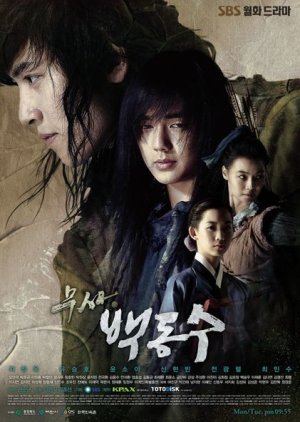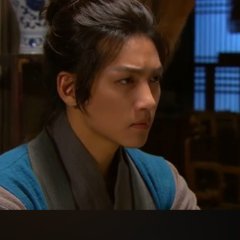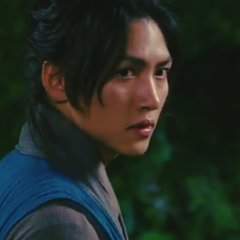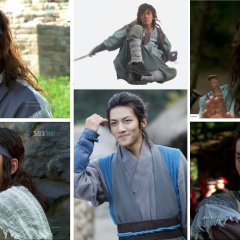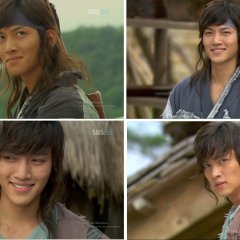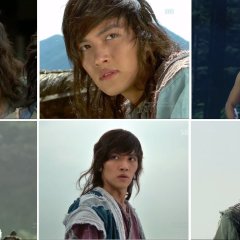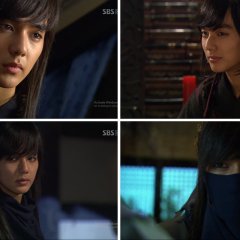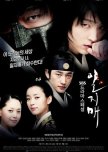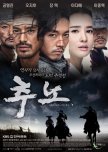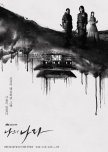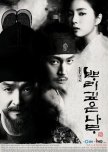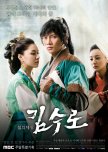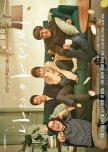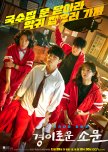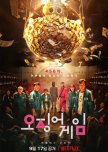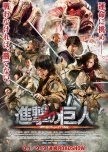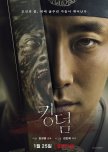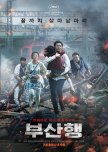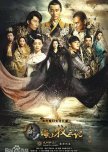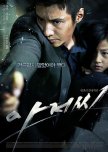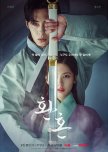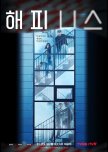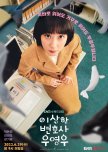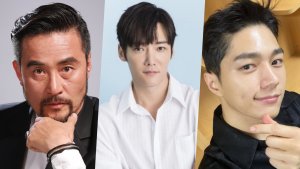 Choi Min Soo confirmed to star in the upcoming K-drama "Accounting Firm"
Choi Min Soo confirmed to star in the upcoming K-drama "Accounting Firm" - Nederlands
- English
- magyar / magyar nyelv
- dansk
- Oorspronkelijke titel: 무사 백동수
- Ook gekend als: Musa Baek Dong Soo , Honorable Baek Dong Soo , Warrior Baek Dong Su , Yanoe Baek Dong Su
- Regisseur: Kim Hong Seon, Lee Hyun Jik
- Scenarioschrijver: Kwon Soon Gyu
- Genres: Actie, Historisch, Romance, Vechtsporten
Cast & Credits
- Ji Chang Wook Hoofdrol
- Yoo Seung Ho Hoofdrol
- Yoon So Yi Hoofdrol
- Shin Hyun Bin Hoofdrol
- Yeo Jin GooBaek Dong Soo [Young]Bijrol
- Park Gun WooYeo Wun [Young]Bijrol
beoordelingen

The plot is a hot mess. Very hot on the eyes and the heart and very much a mess for the intellect. But, frankly, I was more than willing to overlook every plot-hole, every unrealistic twist, every narrative ingenuity while watching, because the emotions portrayed were so strong, so moving and beautiful, it was like swimming in self-inflicted, desired pain. This is a story of friendship, and this aspect is wonderful. I rejoiced in every scene which would bring the friends/rivals together on screen and not surprisingly those scenes are the best shot ones too, with some stunning choreography and mesmerizing music. I could have watched 29 hours of sword fights or friends silently sitting next to each other without complain. This is what the story is about and as I said it's incredibly beautiful.
On the other hand, the plot, or, if you prefer, the writing, goes everywhere and nowhere. Aliens could have landed in Joseon and killed them all with laser beams and it would have gone almost unnoticed in the circus. I'm not saying the politics didn't count, but I simply didn't care. What I cared about were the characters and their bond.
First, the kids: they enchanted me. Because this drama is totally devoid of mother figures – the only living one having refused to be such for 20 years – I suppose my very latent mother instinct came to the surface with a vengeance. The acting by both Yeo Jin Goo and Park Gun Tae was amazing and I'm kind of indignant they are listed as "guest roles" here. In less than 4 episodes they managed to make me love the characters and die to see how they'd connect to one another. The young Wun in particular must be the most harrowing character I've come across in a long while. My desire to kill that father of his with my own hands reached unexpected and disquieting heights.
Then, there's the older generation of friends/foes, mainly Chun the Sky Lord and Gwan Taek, who share a weird bond based on rivalry and grumpy respect shown with swords. I won't spend too many words on the two actors, they are simply brilliant and the director seemed to share my opinion since the best camera works are dedicated to them. I mostly appreciated Choi Min Soo's rendition of his character, which could have easily come out of a Sergio Leone's film.
This drama is based on a manwha and this is particularly obvious in all the main characters who are clear cut and distinctive like drawings.
Not so the adult Dong Soo And Yeo Wun, who mature and change, making this into a coming-of-age drama. As single individuals they are very different, one light the other dark, one goofy the other somber, one stubborn the other easy to manipulate, but together they shine. I loved the acting of both Ji Chang Wook and Yo Seung Ho; the first because he enters the character in a way that makes you instantly forget whatever role you may have seen him in before: here, he's Dong Soo. There's a lot of physicality in his acting, which makes his performance totally believable. Seung Ho has such expressive eyes he steals the screen by a single, all-telling glance. His character is all played on subtlety, which makes it extremely powerful. As I said, separately they do great, but together they are unforgettable. It helps that they are both so smouldering handsome; in a drama based so much upon visuals, this isn't a secondary aspect at all.
Also, I must be the only living creature who liked Shin Hyun Bin here. What everybody described as a wooden performance I found to be delicate and very fitting to her role. What that role was, is another story entirely: the romance is so secondary it's almost non-existent here. This in the most common sense of the word, since the drama is profoundly romantic in the classical definition of sentimental and tumultuous.
I invested a lot of feeling in this drama, this is why the very last minutes infuriated me. I can condone many faults of this script, but I will never, ever forgive the writer for not honouring a particular character the way he deserved, for cutting short on a farewell I had been kind of expecting (and dreading) since the beginning. Many tears welled in my eyes but never had the time to come out, leaving me frustrated and empty. I suppose I should thank the production for hastening my healing process this way, for reminding me life goes on, or I'd be still suffering now. I'm not sure it's fair to lower the overall score of a drama due to the last 10 minutes, but for a show that expects you to leave the brain aside and only watch with the heart it feels like cheating.
The music is a different story. To put it short, this is the best drama Ost I've heard so far. It contributes so much to the feeling I believe it is mainly responsible for my loving the drama and overlooking its faults. Honorable mention to BMK's powerful "Yanoy", to its harrowing acoustic version by Eun Tae Park and to the haunting "Stagnant" by Shin Sung Woo. If you have the chance, give a look at the lyrics too, as they are beautifully poetic.
I don't think I'll watch the entire drama again. I will definitely re-watch single scenes though, just for the wonderful aesthetic of them. On the other hand though, I've watched a disgustingly high number of MVs and fan videos only for the sake of Dong Soo and Yeo Wun. Given how many are to be found, it seems I'm not the only one.
Vond je deze recentie nuttig?

unterwegsimkoreanischenD
26 mensen vonden deze beoordeling nuttig
Deze recentie kan spoilers bevatten
Epic and action are by a humorous ribbon tied together in a touching, gripping way. Go for it!
Set in a jaunty kaleidoscope of relationships, friendships, brothers in arms, blood ties, loyalty, heroism and heartbreak, the time of King Yeongjo, Crown Prince Sado and King Jeongjo is epicly (for a 2011 series production) portrayed."Warrior Baek Dong Soo" is full of fun, martial arts and of course: drama. There is politics, too, yes, butteh KDrama is definitely more on the drama and action side. I benevolently ignored some daring storytelling details and the selectively very optimistic choreographic freedom in the heroic staging. "Warrior Baek Dong Soo" balances between history and entertainment, between epic scope and personal tragedy, between deep, dramatic emotionality and airy, playful, humorous, good mood. The KDrama finds a rousing swell, in which the emotional waves are allowed to splash from all directions - with a story that sails between historically memorable facts, legendary heroes, steep (but by no means absurd) hypotheses, and colorful dramaturgical freedom. It offers great entertainment thanks to an exceptionally strong presence of all actors - whether young or old.
Baek Dong-soo himself is wonderfully portrayed by Yoo Jin-goo (young) and Ji Chang-wook (adult) in the sense of a largely impulsive jester who wears his heart on his sleeve. On the other hand, there is the introverted, somehow tragic, always serious and withdrawn Yeo Woon (Yoo Seung-ho as an adult and Park Gun-woo as a boy). The demanding life of the young warriors is sweetened by the unique charms of Hwang Jin-joo (cheeky, tomboyish: Yoon So-yi) and Yoo Ji-sun (stoic, reserved: Shin Hyun-bin). The by now veteran acting legend Choi Min-su as assassin lord in gothic style gives his very personal flavor throughout the 29-episodes long ride through time. And quite a few more there are.
In this KDrama it is rather the dramatic love story and love triangle of the older generation that pushes itself emotionally to the fore than that of the younger generation. This is probably due to the fact that Baek Dong-soo's generation is more dominated by humor and a cheeky mouth that wants to take on fate, while the older generation is dominated by the decades-long heavy burden of overwhelming life experience.
The historical hook of "Warrior Baek Dong Soo" is (as the title suggests) Baek Dong-soo, who went down in history as a heroic swordsman legend. He was one of three authors of the 'Muye Dobo Tongji' (= Illustrated Manual of Martial Arts), which is now officially classified World Heritage. This four-volume work summarizes the common weapon techniques of the Joseon period. (The book gained its extraordinary importance as a rare, valuable historical source on military affairs and Joseon martial arts, since older works fell victim to the destructive Qing invasions from the north.) However, swordsman Back Dong-soo first of all became legendary because he repeatedly saved King Jeongjo from being assassinated. And this juxtaposition of swordsmen serving the king versus assassins serving a however motivated client, originally inspired the 2010 KDrama comic entitled Honorable Back-Dong-soo.
The KDrama "Warrior Baek Dong Soo" thus also contrasts swordsmen and assassins - in terms of their ethics, their loyalty, their code, their mission, their training, their emotional world. This ambivalent and tragic dynamic makes the 29 episodes going and the time spent watching it worthwhile. They are so similar and yet they are worlds apart. One has to protect, the other has to kill. And yet, he who kills also protects. And yet, he who protects also kills. Both are henchmen. Both give everything. Risk everything. They're simply on different sides. Depending on the situation, the act of the swordsman is considered correct and honorable, while that of the assassin is considered a crime and vile. In my opinion, the KDrama reveals one of its strongest moments in the emotional explosiveness of the fatal bond between the first swordsman and the leading assassin lord (each of their own generation). They are so close emotionally and yet they live in different worlds: One in the light open, the other in secret. In tried and tested KDrama manner, the 'bad guys' (assassins) once again - despite the concentrated ambivalence of their characters - play their way taciturnly, but effectively into the hearts of the audience.
The framework for the plot is in beautiful continuity provided by sword fights and political intrigues. The flesh is made of fatal, ambivalent, intense relationship ties and feuds between the protagonists. History sets the direction. Epic and action are by a humorous ribbon tied together in a touching, gripping way. Go for it!
---------------------------------------------------------
Historical SIDE NOTE: --- Yangban of Joseon in the 18th century between conservative thinking and reformist, modern impulses. ---
The historical background of KDrama is shaped by three memorable decendants of the Joseon Dynasty. King Yeongjo, who holds the record-breaking 52-year reign on the throne, Crown Prince Sado, who went down in history as a tragic, possibly greatly misunderstood figure, and his son, who contributed to peace and prosperity as King Jeongjo. In addition to the serious efforts of the two kings for stability and progress, there are the divided camps among the nobles who fight by all means for their supremacy in political and social affairs.
Between 1674 and 1689 the Namin (Easterners) steered the administration of the country in their interests, followed by the Seoin (Westerners), who then entangled their position of power in disputes: the Noron representing the old, strict, conservative neo-Confucian doctrine and the Soron fighting for a new, modern, reformist, practice-oriented doctrine (Sirhak). It was probably King Yeongju's merit that despite the massive differences, the balance of power between the camps was well balanced for a long time. However, the price he had to pay for reasonably stable living conditions in the empire was his son, Crown Prince Sado, who favoured modern teaching and thus provoked the Noron. At least that is how one historical theory interprets the dramatic events surrounding Sado, who is said to have died locked in a box. The KDrama follows this theory (and not the annals, that present Sado as falling into insanity that could no longer be curbed, or a third theory that suspects a massive father-son conflict as the cause).
So, in line with the theory, which sees Sado as a progressive, reformist spirit, who wants to liberate his country from the supremacy of the Qing, "Warrior Baek Dong Soo" tells the story of the loyal followers of the ruling family, who are skilled in martial arts, and how King Jeongjo wants to live up to his father's modern visions. In doing so, with an open attitude the young king, too, always chose a balance and thus continued the proven political strategy of his grandfather, who in doing was able to stay alive more than half a century. In this way, King Jeongjo succeeded in the 24 years of his reign between 1776 and 1800 in building the Hwaseong Fortress as the center of his reign, in advancing education and science, in optimizing national defense and in creating the Royal National Library of Gyujanggak. However, he could never be sure of his life... at least seven assassination attempts alone during his first year in power are historically recorded. ... A striking reflection of the massive resistance against the attempted modernization of thinking in Yangban circles.
Vond je deze recentie nuttig?

